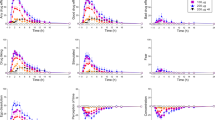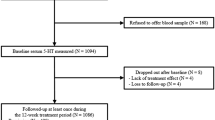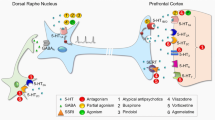Summary.
The nature of the discrepancy between short-term pharmacokinetic data (hours) on the one hand and long-term pharmacodynamic effects and the clinical latency of therapeutic amelioration on the other hand by tricyclic antidepressants is still unclear. A relapsed sensibilization of neuronal, immunologic, and endocrinologic systems by changes in receptor sensitivity has been proposed. However, the discrepancy may have a strong influence on many aspects of antidepressive therapy in humans. The aim of our study was to demonstrate long-term pharmacodynamic effects by single-dose antidepressive treatment in humans by measuring heart rate parameters in response to neurochemical parameters. 25 young healthy probands, divided into three treatment groups (amitriptyline, n = 10; clomipramine, n = 10; placebo, n = 5), were challenged by a noradrenaline infusion test at baseline and one and 21 days after a single dose of antidepressant. Heart rate and blood pressure as well as plasma levels of antidepressants and of noradrenaline and adrenaline were measured in response to noradrenaline infusion test. Noradrenaline infusion rate to reach an increase in blood pressure of RR > 30 mmHg was significantly decreased for both antidepressants on day 1. The same effect was true for the amitriptyline group on day 21. Furthermore, pretreated probands respond to antidepressants in a different way when compared to untreated probands. Like depressed patients under therapy they respond with a dramatic increase in sensitivity of the α1-adrenergic receptor. We could demonstrate that the long-term pharmacodynamic effects have a strong influence on antidepressive therapy. A prolonged pharmacodynamic effect influences further clinical studies as well as our thinking about adverse drug effects. In clinical studies, washout periods may be to short to overcome the benefits of a previous medication. Adverse drug effects are often seen during periods when drugs were changed. The negative effect may be due to an additional effect of both medicaments.
Similar content being viewed by others
Author information
Authors and Affiliations
Additional information
Received May 15, 2000; accepted September 25, 2000
Rights and permissions
About this article
Cite this article
Jungkunz, G., Kuss, HJ. & Gsell, W. Long-term effects of tricyclic antidepressants on norepinephrine kinetics in humans. J Neural Transm 108, 349–362 (2001). https://doi.org/10.1007/s007020170080
Issue Date:
DOI: https://doi.org/10.1007/s007020170080




